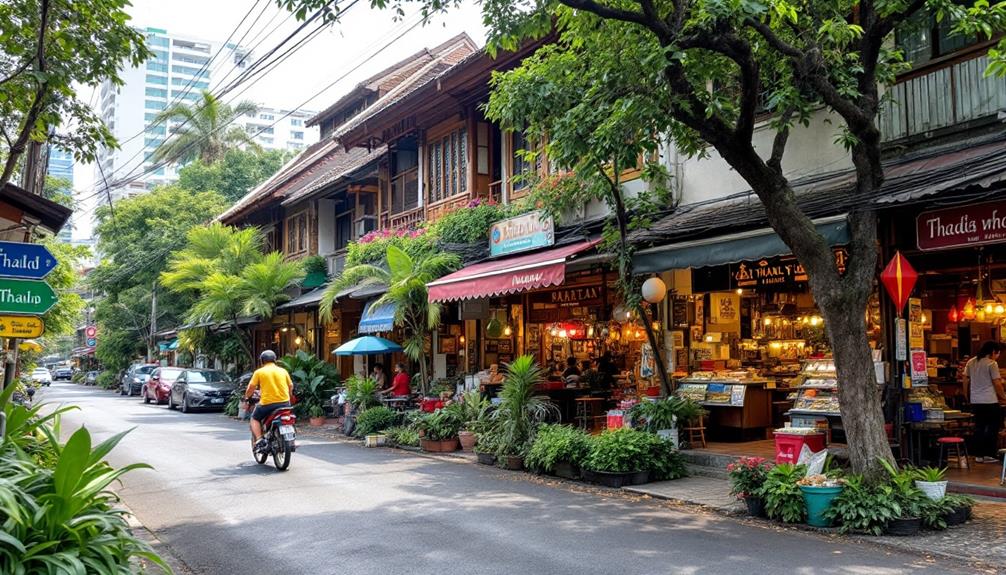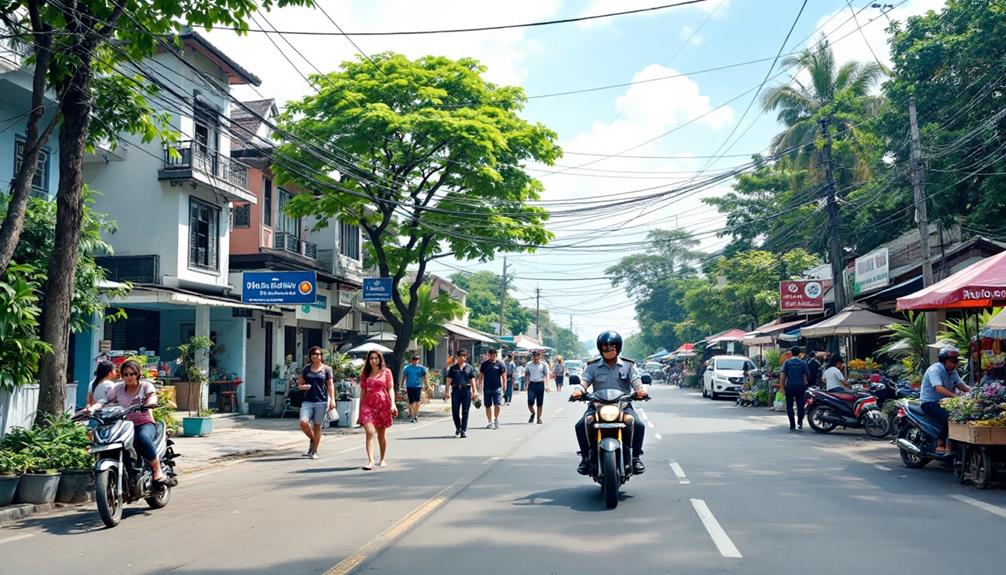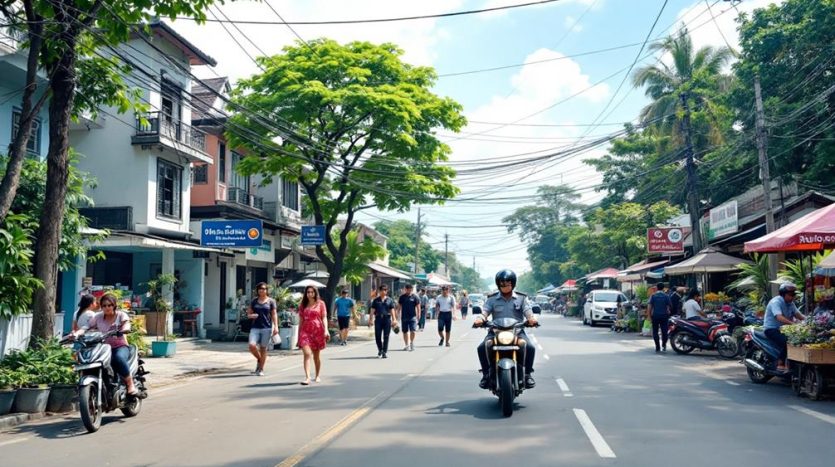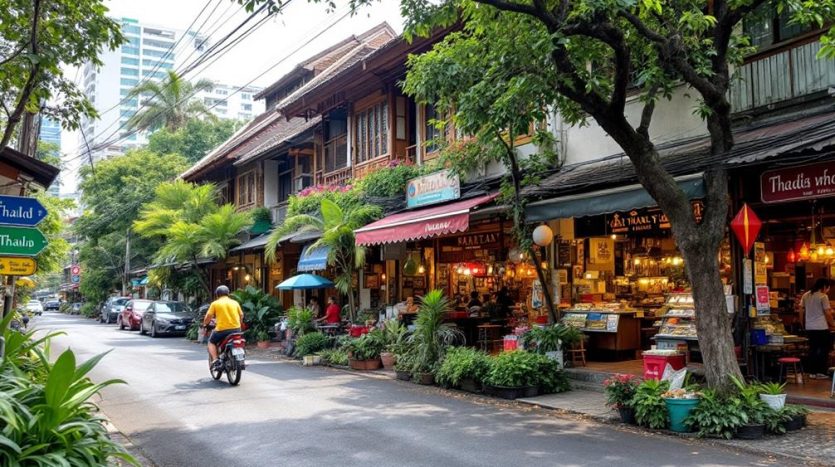Can I Live in Thailand as a Foreigner?
You're probably wondering if living in Thailand as a foreigner is a realistic possibility or just an enticing fantasy. With numerous visa options and a welcoming culture, the dream seems within reach. However, the intricacies of work permits and understanding local customs might challenge your assumptions. Imagine traversing the bustling streets of Bangkok or relaxing on a serene beach, but there's more to reflect upon than just the scenery. What about the cost of living, healthcare, and building a community? Let's explore what it truly takes to make Thailand your home.
Key Takeaways
- Foreigners can live in Thailand by obtaining appropriate visas, such as tourist, business, or retirement visas.
- Work permits are necessary for employment, requiring a job offer and assistance from the employer.
- Accommodation options include renting condos, homes, or serviced apartments to suit various budgets.
- Language learning and cultural integration are essential for a fulfilling experience in Thai society.
- Affordable healthcare and insurance plans are crucial for managing health needs as an expat.
Understanding Visa Options

Understanding the various visa options is essential when planning to live in Thailand as a foreigner. Imagine this: you're sipping a coconut under a palm tree, but wait, did you remember the tourist visa only lets you do that for 60 days? Fear not! Thailand's got a buffet of visa options, and you're invited.
For those eyeing a more extended stay, long-term visas are your golden ticket. Retirees can kick back with retirement visas, ensuring their days are filled with beaches and not bureaucracy. If learning Thai dishes is on your bucket list, education visas let you take cooking classes—or maybe even Muay Thai, if you're feeling feisty.
Got a business idea? Business visas and non-immigrant visas open doors to opportunities, provided you follow visa regulations. And if you're falling in love with the land of smiles, visa extensions can help. Just be ready for a game of hide and seek with Thai bureaucracy.
The trick is balancing between embracing Thai culture and managing visa paperwork. So, keep your sense of humor handy—it's as essential as your passport. After all, who said immigration can't be fun?
Navigating Work Permits
Diving into the world of work permits in Thailand can feel like unraveling a mystery, but don't worry, it's all part of the adventure.
First things first, you'll need a job offer because the Thai work permit processes love a good plot twist. Once you've snagged that job offer, your employer becomes your co-star, helping you navigate the labyrinth of employment regulations.
For those considering a long-term stay, a valid Non-Immigrant Visa will be essential, especially when engaging in rental agreements.
Now, let's talk about the job market. Thailand's job market can be as spicy as its street food, so having foreign qualifications that stand out is your secret ingredient. Be prepared for the occasional curveball, like the requirement to prove that the job couldn't be filled by a Thai national. It's just the government's way of ensuring that everyone gets a fair shot at the spotlight.
A bit of cultural insight: Thai bureaucracy is like a gentle river—sometimes it flows smoothly, other times it takes unexpected turns. Patience is your best friend here.
And hey, don't be afraid to share a laugh with the officials; a little humor goes a long way in easing the process. After all, you're not just getting a work permit; you're earning a Thai adventure badge!
Finding Accommodation

When you're looking for a place to stay in Thailand, you'll find a variety of housing options ranging from modern condos to traditional Thai houses.
It's crucial to check for amenities like air conditioning, which can greatly enhance your comfort, especially in urban areas.
The rental markets in Thailand offer diverse options for various budgets, providing a comfortable lifestyle without excessive costs.
You should weigh the pros and cons of renting versus buying, as both have unique benefits depending on your long-term plans.
Keep in mind that the cost of living can vary greatly between bustling cities like Bangkok and quieter towns, so consider your lifestyle preferences and budget carefully.
Types of Housing Options
Finding a place to live in Thailand offers a variety of options to suit different lifestyles and budgets.
If condo living tickles your fancy, you're in luck! Thailand's condos often come with pools and gyms, perfect for expats who want to live like they're on permanent vacation.
For those who prefer house rentals, local neighborhoods offer a taste of authentic Thai life—just beware of the geckos who might join your morning yoga sessions.
For the fancy folks, luxury villas await with infinity pools and views that scream "I'm living my best life."
Serviced apartments are your go-to for short term leases, ideal if commitment scares you more than the idea of eating durian.
Traditional homes give a charming peek into Thai culture, but may include a few quirks—like a bathroom you could confuse for a wet market.
Budget accommodations might mean rural living, where buffaloes are your neighbors and you'll save enough baht to splurge on street food adventures.
Expat housing communities are also popular, as they provide a supportive network and familiar faces, making it easier to settle into the Land of Smiles.
Renting vs. Buying
Choosing between renting and buying accommodation in Thailand can dramatically shape your experience. Imagine the flexibility of renting—just like wearing a pair of elastic pants after a big meal. The renting advantages are clear: fewer long-term commitments, and no sweaty palms over property taxes. However, don't forget to read rental agreements thoroughly. They might contain surprises, like a clause about your landlord's cat visiting every Tuesday.
| Renting Advantages | Buying Considerations |
|---|---|
| Flexibility | Long-term commitment |
| Lower upfront costs | Potential equity growth |
| Limited responsibility | Property taxes |
Now, let's talk buying. You'll need to navigate ownership regulations and consider market trends. Sure, there's investment potential, but it's also like dating a crocodile—exciting, yet slightly terrifying. Immerse yourself in the world of property taxes and ownership rules, and you might just find tenant rights less headache-inducing.
Cost of Living
Steering through the cost of living in Thailand, particularly when it comes to finding accommodation, can initially feel like solving a puzzle with too many pieces.
But fear not, adventurous expat! With a dash of humor and a sprinkle of savvy, you'll master it. First off, your lifestyle choices will dictate whether you're living in a swanky Bangkok high-rise or a charming Chiang Mai bungalow.
Remember, grocery expenses and utility costs won't be the same everywhere.
Keep these in mind:
- Currency fluctuations: The baht seems to have its own mood swings, so keep an eye on those exchange rates.
- Inflation rates: Just like your favorite jeans, prices can unexpectedly stretch.
- Dining out: Thai street food is cheap and delicious, but fancy dinners will quickly dent your entertainment budget.
- Transportation fees: Tuk-tuks are fun, but your personal savings might prefer public transit.
Your shopping habits will also come into play.
Malls are tempting, but local markets offer bargains that make your wallet sing. It's all about balance.
Cost of Living Insights
When you move to Thailand, one of the first things you'll notice is how the cost of living can vary greatly depending on your lifestyle and location. Want to live like royalty on a budget? Hit the local markets for fresh produce; grocery prices there are a steal compared to Western standards. Dining expenses can range from cheap and cheerful street food to five-star dining that'll make your wallet wince.
Here's a quick comparison to help you plan:
| Category | Estimated Cost (USD) |
|---|---|
| Local Markets | $30 per week |
| Dining Out (Street) | $1-3 per meal |
| Dining Out (Fancy) | $20-50 per meal |
| Entertainment | $10-30 per night |
Entertainment costs can be as low or high as you like. Catch a local movie for peanuts or splurge on a lavish night out. Transportation fees are another area where lifestyle choices matter. Grab a tuk-tuk, but don't be surprised if your bargaining skills are tested. Utility bills are generally low, though air conditioning can be a sneaky expense. Remember, budgeting tips are your best friend here. Prioritize what makes you happy and adjust your spending accordingly—just try not to spend it all on pad thai!
Healthcare and Insurance

Maneuvering healthcare in Thailand as a foreigner means understanding the differences between public and private options.
Public hospitals offer affordable care, but you might experience long wait times and language barriers, so many expats prefer private facilities for their efficiency and English-speaking staff.
Additionally, it's important to recognize the regional price variations that can influence the cost of living, including healthcare expenses.
Don't forget, it's vital to have the right insurance coverage; some visas even require it, ensuring you're financially protected in case of unexpected medical needs.
Public Vs Private Options
Diving into the healthcare system in Thailand, you'll quickly notice the distinct differences between public and private options. Public services are affordable, but can feel like a community event with everyone and their distant cousin waiting for care.
On the flip side, private healthcare is like a VIP pass to speedy service, with costs to match your newfound luxury.
Navigating these options, consider:
- Community involvement: Public hospitals offer a genuine slice of Thai life, akin to attending cultural events and language exchanges for free—just with more thermometers.
- Recreational activities: Think of private hospitals as health clubs, where you can indulge in treatments like they're recreational activities, minus the poolside cocktails.
- Local markets vs. high-end malls: Public healthcare is your trusty local market—reliable but bustling. Private care feels like shopping at a luxury mall, where everything's shiny and comes with a price tag.
- Social networks: Word-of-mouth here is gold. Legal considerations aside, your social network can guide you to the best choices, blending lifestyle differences with practicality in healthcare.
In Thailand, whether you opt for public or private, remember: healthcare is another adventure in your expat journey.
Insurance Requirements for Expats
Starting your expat journey in Thailand means it's important to understand the insurance requirements tailored for foreigners. First things first, grab a cup of Thai iced tea and explore the world of health insurance.
It's critical to find insurance providers that can cater to your expatriate needs. From travel insurance for those spontaneous weekend getaways to thorough health insurance for when you've eaten one too many chili peppers, having the right coverage options is significant.
Policy comparisons are your new best friend. They'll help you navigate the maze of insurance costs and legal requirements without losing your sanity—or your savings.
Don't forget to check out the claims process; you'll want it to be as smooth as a tuk-tuk ride, not a bumpy elephant trek. Emergency services should be of high quality, because let's face it, you never know when you might need a quick escape from a questionable street food adventure.
Learning the Language
Mastering the Thai language can be both a rewarding and challenging endeavor for any foreigner living in Thailand. You'll quickly discover that language immersion is your best friend. Engage in conversation practice with locals; they'll appreciate your attempts and might even chuckle at your pronunciation mishaps. It's all part of the fun!
To boost your skills, explore various language resources. Consider enrolling in language schools or joining language meetups for some face-to-face learning. If you're more of a digital learner, online courses and language apps can be lifesavers.
Here are some handy tips to get you started:
- Pronunciation tips: Thai tones can turn "rice" into "enemy." Tread carefully!
- Local dialects: Don't be surprised if the local lingo varies from what you learn in class.
- Cultural exchanges: Engage in cultural exchanges to deepen your understanding.
- Language resources: Keep a dictionary app handy for those "what did I just say?" moments.
Embracing Thai Culture

To truly embrace Thai culture, start by understanding local traditions, which are deeply rooted in respect and community.
Learning basic Thai language not only helps you navigate daily life but also shows locals your genuine interest in their way of life.
You'll find that even a simple greeting in Thai can open doors to meaningful connections and enrich your experience.
Understanding Local Traditions
Some might say that understanding local traditions is the key to truly embracing Thai culture. You'll quickly discover that Thailand's rich tapestry of cultural festivals, social etiquette, and family values are woven into the everyday fabric of life.
Picture yourself at a lively water-splashing extravaganza like Songkran or joining a community at a temple fair, soaking in the vibrant art heritage and folk traditions.
To truly blend in, consider the following tips:
- Dive into traditional cuisine: Thai food is a flavor explosion. Don't be a stranger to street food stalls; they offer a culinary adventure you won't forget.
- Respect religious practices: When visiting temples, dress modestly and remove your shoes. Nobody wants to see you get the side-eye from a monk.
- Master social etiquette: Wai (bowing with hands together) your way into Thai hearts. Just don't overdo it; you're not auditioning for a yoga retreat.
- Participate in holiday celebrations: Join in on the fun, whether it's lighting lanterns during Loy Krathong or dancing the night away.
Learning Basic Thai Language
Maneuvering the streets of Thailand becomes a lot more rewarding when you can greet locals with a friendly "Sawasdee" or express gratitude with a heartfelt "Kob khun". Suddenly, you're not just another tourist; you're part of the tapestry.
Language immersion doesn't mean you have to be fluent overnight. Start with everyday phrases and sprinkle in some local slang. Who doesn't love a cheeky "mai bpen rai" ("no worries") when things don't go as planned?
Dive into language apps that transform your daily commute into a mini Thai lesson. Aim for conversation practice with shopkeepers or your favorite street food vendor. They'll appreciate your effort, even if your pronunciation sounds like a cat coughing up a hairball.
Find a language exchange buddy for personalized learning, and don't shy away from language schools for structured guidance. There's an abundance of learning resources for tapping into the cultural nuances of this beautiful tongue.
Transportation in Thailand
Maneuvering the bustling streets of Thailand is an adventure in itself, offering a unique blend of modern convenience and cultural charm.
Whether you're hopping on public transport or daring to try motorbike rentals, there's something for everyone. Just remember, in Thailand, traffic regulations are more of a suggestion than a rule!
To help you conquer the streets, here are some handy tips:
- Public transport: Bangkok's BTS and MRT systems are your friends. They're clean, reliable, and thankfully air-conditioned.
- Taxi services and ride-sharing apps: Grab and Bolt are popular options. Just be ready for the driver's playlist, which ranges from Thai pop to, well, more Thai pop.
- Motorbike rentals: Feeling brave? Renting a motorbike is an exhilarating way to see the country. Just make sure your insurance policy is up to date!
- Bicycle commuting: If you're feeling eco-friendly, cycling is an option. Just be prepared for a workout and a few curious stares.
Transportation apps can also help you with airport transfers or steering through local routes.
With a bit of humor and patience, you'll master the art of getting around in no time. Enjoy the ride!
Expat Communities

Among the myriad of experiences awaiting foreigners in Thailand, joining expat communities can be one of the most enriching. Picture yourself sipping a coconut while swapping stories with people who understand the struggle of deciphering Thai street signs. These communities offer expat support that's as comforting as a bowl of spicy tom yum.
Dive into community events where you'll find cultural exchange that'll have you mastering the Thai wai in no time. Networking opportunities abound, offering a chance to meet folks from all walks of life—just try not to mix up the software developer with the elephant whisperer.
Social clubs cater to every hobby, from underwater basket weaving to more traditional pursuits like photography and book clubs. Language meetups are a fantastic way to practice your Thai, even if you end up accidentally ordering 20 bowls of noodles instead of two.
Get involved in local festivals to truly soak up the culture, and don't miss the food experiences that'll make your taste buds dance. Travel groups are perfect for exploring Thailand's hidden gems. And, when you're feeling lazy, online forums are there for a quick dose of expat wisdom.
In Thailand, you'll never feel alone.
Banking and Finances
While immersing yourself in the vibrant expat communities of Thailand, it's also important to get a handle on your banking and finances.
After all, you don't want to be the expat who runs out of cash just as the street food vendor hands you a steaming plate of pad thai. Setting up a local bank account can help you manage your finances more smoothly.
Steering through the world of foreign exchange is like riding a tuk-tuk; it's fast and occasionally bewildering, but definitely manageable with some practice.
Here are some tips to help you along:
- Choose a bank wisely: Not all banks are created equal. Look for one with English-speaking staff and low foreign transaction fees.
- Embrace mobile banking: Thai banks offer fantastic mobile apps that might even make your current bank jealous.
- Know your foreign exchange rates: Keep an eye on rates and use reputable services to get the best bang for your baht.
- ATMs are your friends, but with limits: They're everywhere, but don't be surprised if they charge you a fee every time your card makes an appearance.
Safety and Security

Maneuvering the bustling streets of Thailand requires both awareness and understanding of local customs to guarantee your safety and security.
First, let's talk crime rates. They're relatively low, but don't let that lull you into a false sense of security; pickpockets have an uncanny ability to spot a distracted tourist a mile away. Stay sharp and keep your belongings close.
Now, safety tips: blend in like a local by respecting cultural practices—like removing your shoes before entering temples. It's both a sign of respect and a great way to avoid awkward stares.
Always carry a copy of your passport, just in case you run into local laws that require ID checks.
In case of emergencies, Thailand's emergency services are reliable but knowing some basic Thai phrases can speed things up. "Chuey dooay!" means "help!", and it might just be your magic word.
Neighborhood safety can vary, so do some research before choosing where to live. Some areas are as safe as a kitten in a yarn store, while others are more like a squirrel on Red Bull.
Always prioritize personal safety and travel safety by staying informed and aware.
Schools and Education
When you're settling into life in Thailand, understanding the education system can be just as important as knowing the local customs. You might think choosing a school is like picking a favorite Pad Thai stall—simple, right? Well, not quite! Here's a taste of what's on the menu:
- International Schools: These are a hot choice for expats, offering familiar curricula and high academic standards. It's like a slice of home, but with more tropical fruit in your lunchbox.
- Language Schools: Perfect if you want to pick up Thai, or any of the numerous languages offered. A great way to avoid accidentally ordering spicy chicken feet at dinner.
- Homeschooling Options: If you prefer to keep your kids close and their education closer, Thailand has a growing community of homeschoolers. Cue the pajama classroom!
- Extracurricular Activities: From Muay Thai to Thai cooking classes, there's no shortage of ways to keep kids engaged beyond the books.
Enrollment processes can be as thrilling as a tuk-tuk ride, so start early.
Don't forget that cultural exchanges are part of the fun. Immerse yourself in the educational resources available and make the most of your Thai adventure!










